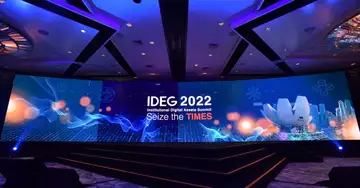How do we see the future of digital assets in the mainstream?
After several years of massive expansion of blockchain, cryptocurrencies and non-fungible tokens (NFTs), Digital Assets Management Group IDEG, part of CTH Group alongside Web 3.0 infrastructure services pioneer Atlas, just wrapped up its Institutional Digital Assets Summit in Singapore. The presentations and discussions, which were insightful, stimulating and interesting in equal measure, focused on a wide range of topics critical to the digital assets ecosystem.
But a single thread seemed to unite them all: What are the challenges and opportunities we must embrace as digital assets become an integral part of the mainstream?
Be ready for future opportunities
The summit kicked off with an address by Raymond Yuan, CEO of CTH Group, one of the world's leading thought leaders in the blockchain ecosystem. Among the topics Yuan addressed in his wide-ranging talk on Web 3 megatrends and digital assets were the principles blockchain players must follow if they want to prevent incidents like the Ronin hack from happening again.
Building on what he discussed in a recent article published on CoinDesk, Yuan explained Atlas' "ISG" (Infrastructure, Signing Authority and Governance) formula. It allows blockchains to scale - something they will increasingly need as their widespread use in mainstream activities becomes better understood - without compromising their security or decentralization. If more blockchain architects heed Yuan's advice, we're likely to see smooth and robust implementations of blockchains across a range of industries in the coming years.
Realizing the full potential of blockchain
While Yuan outlined how blockchains need to be designed to solidify their position in the mainstream, many of the speakers and panelists following his address shed light on where the potential for new blockchain implementations lies.
Markus Thielen, Chief Investment Officer of IDEG, gave a presentation on institutional adoption of digital assets through the use of fundamental analysis, as protocols with revenues can now be valued on a cash flow basis. He also introduced IDEG's flagship fund, "All-Weather'' TIMES, which allows investors to invest in strategies that are expected to perform well in a balanced market environment.
Wang Hao, managing director of IDEG, moderated a panel discussion on NFTs and the Metaverse. Participants had a lot to say about the recent spate of investment in NFTs and the huge potential returns that their integration into a rapidly expanding metaverse brings. They also took a critical look at the issues that companies and institutional investors need to consider when formulating strategies to engage and expand their user base based on their investments in NFT and metaverse ecosystems.
This call for balance in response to mainstream growth was echoed in the panel discussion on institutional staking and decentralized finance (DeFi). Led by Kevin Loo, Head of Investment Insights at IDEG, the panel discussed institutional investors' mixed feelings about participating in blockchain-based investments: While on the one hand they see the benefits of participating, on the other they are looking for guidance on how to contribute to this young sector.
Not surprisingly, the collapse of Terra and LUNA were cited as examples of why a hasty entry into all forms of DeFi and crypto must be avoided and better managed if the sector is to thrive in the long term. Most importantly, the innovative new investment vehicles that will continue to emerge must build on lessons learned from cases like Terra's LUNA.
Some of the panel discussions focused on established subsectors of finance where digital assets remain unexplored. For example, the panel on opportunities for family offices and private wealth management, led by Christophe Lee, head of institutional sales at IDEG, highlighted the great enthusiasm of smaller firms that manage assets for individuals to integrate digital assets into their client offerings. Again, the summit showed that digital assets are entering the mainstream of finance. Similarly, the panel discussion on liquidity providers in digital assets showed how diverse the range of market makers interested in digital assets has become.
Highlighting the status of the global regulatory environment, the panel discussion addressed the challenges faced by different jurisdictions in striking a balance between protecting consumers and fostering growth in the digital asset space. The need for solutions was a common thread throughout the discussion, with one panelist even suggesting that the clear message from Davos is that the industry will only take a more prominent position alongside global institutions if it overcomes its risk-related growing pains. Among the suggestions discussed on the panel was whether retail investors who can access the asset class through professionals - who can help them find opportunities and manage risk - are less vulnerable to fraud.
Partnering with experts
In between all the panelists and fascinating insights into current and future trends in digital assets, there was a steady stream of nuanced practical advice for players across the blockchain and financial ecosystem.
The thought leadership on display here made it clear that working with experts - who have a track record of navigating the dynamic ecosystems of blockchains - is the surest way to address the expected or unexpected challenges that will arise as more mainstream sectors build on blockchain.
To stay up to date on these challenges, follow IDEG and contact us at [email protected] for more details on this event and our future events.

